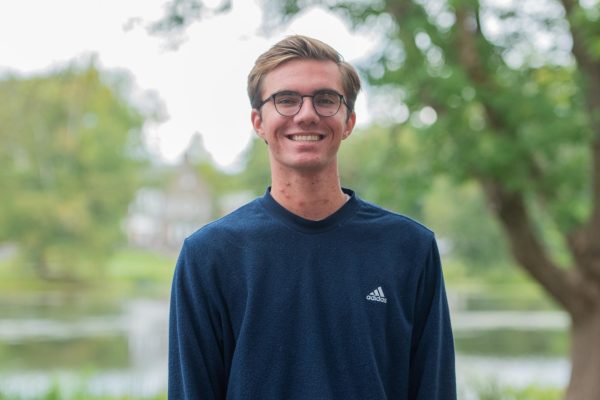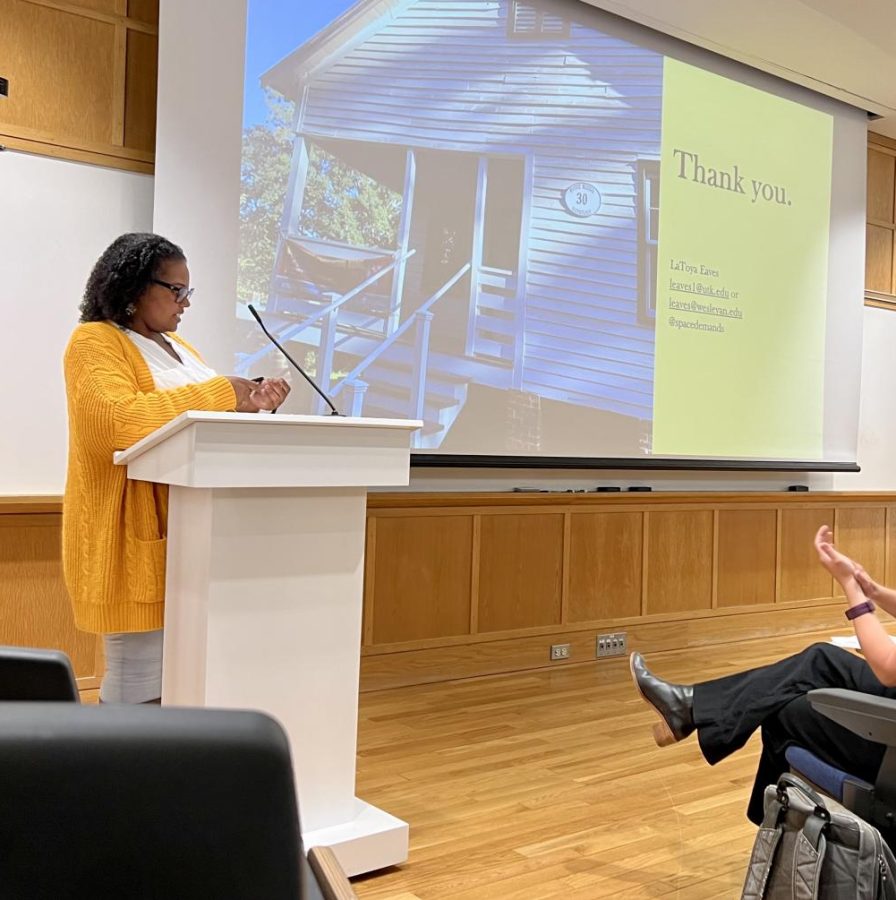Dr. LaToya Eaves Uncovers Southern Black Feminist Geographies in Gould Memorial Lecture
As part of the annual Peter C. Gould Memorial Lecture series, Colgate University’s Department of Geography invited Dr. LaToya Eaves, assistant professor of geography at the University of Tennessee, to speak about her research covering the diverse knowledge productions of the U.S. South, specifically through Black feminist theory. The lecture, titled “Uncomfortable Spaces: Placing Black Feminist Geographies in the U.S. South,” took place in Persson Auditorium on Thursday, April 20.
Marking the first Gould lecture since the beginning of the COVID-19 pandemic, Eaves was nominated and selected by the Department of Geography faculty. Assistant Professor of Geography Emily Mitchell-Eaton, who helped to organize the event, believed that Eaves’ research could add important contexts to the work that students are completing in her senior seminar class, GEOG 401: Mobilities, especially regarding “mobility justice” within contemporary mobilities.
“Dr. Eaves’ work on Black geographies — which develops the concept of a ‘Black sense of place’ — helps us to re-center Black queer women’s experiences of space and place, and to critique notions of Blackness as ‘out of place,’ including in spaces of academia,” Mitchell-Eaton said.
Mitchell-Eaton also invited Eaves to visit her senior seminar and join students for lunch at the ALANA Cultural Center.
Eaves is currently in the process of writing two book manuscripts: “Unbounded: Notes on Southern Black Feminist Geographies” and “Something Special: The Place of Queerness in the U.S. South.” She described how her current research builds upon decades of Black feminist geography, focusing throughout the presentation on understanding Black women in the South as producers of knowledge and activism. She emphasized the legacies of figures such as Ida B. Wells, Ellen Churchill Semple, Septima Clark and Anna J. Cooper. Through these examples, Eaves noted how introducing questions of gender into human geography challenges existing structures.
“One of the challenges of feminist geographies in its legacy has been where Black human geographies have been re-specialized and contingent upon a white imaginary and white spatial thinking in feminist geography,” Eaves said. “In alignment with the call to dismantle systems that have rendered transnational Black feminist contributions invisible, the book that I’m working on recognizes Black women as under-acknowledged producers of geographic knowledge and centralizes the unknowable figures.”
The University of Tennessee Professor also highlighted the work of activist organizations such as Southerners on New Ground (SONG), which advocates for LGBTQ+ liberation in the South; Southern Movement Assembly, which Eaves argues connects the theory of geographical placemaking with abolition and activism; and Healthy and Free Tennessee, a reproductive justice group in her state of residence. Eaves explained how Healthy and Free Tennessee’s billboard campaigns strategically targeted quickly-growing areas — such as Murfreesboro, TN — to create a more notable impact.
“Healthy and Free Tennessee recognizes the need to publicly engage reproductive justice in a city that has long been maintained through persistent political strongholds in power, including Murfreesboro’s churches,” Eaves explained. “The spatial strategy of placing their billboards within city limits […] is a direct disruption of power structures that have imposed homogeneous, racialized, heterosexual norms and gender norms in the city, state, and the region.”
Senior Morgan Gregg — a geography major currently working on her senior seminar project — remarked that she was grateful to have attended Eaves’ presentation.
“I have spent much of my time at Colgate learning from Black geographies, and my senior seminar project as well as recent research has grappled with similar concepts in the context of Syracuse, NY,” Gregg said. “I was interested in learning from her how Black feminism challenges hegemonic understandings of spatiality on the large scale of the U.S. South as a region. Dr. Eaves’ work is invaluable to the literature in this unrepresented field and has greatly informed my knowledge on the subject.”
The lecture ended with a Q&A session, where Eaves responded to students’ questions by underscoring the relevancy of engaging with people on-the-ground for research, as well as noting the current reshaping of pedagogy in which Black-owned spaces have taken control over education.
“While it would be impossible to choose only one key takeaway from Dr. Eaves’s talk — her contributions to geographic thought are incredibly multifaceted — an important takeaway was that Black women are, and have long been, producers of geographic knowledge,” Mitchell-Eaton said. “Dr. Eaves’s talk and her larger body of work emphasize that essential geographic knowledge, both in academic scholarship and in everyday life, is forged through a plurality of perspectives, including Black, feminist, queer, and Southern and diasporic perspectives. Geographers are at the forefront of some of the most pressing issues of our time, including prison abolition, racial justice, reproductive justice, and human displacement, and this event really made that clear.”

Ryan Dugdale is a junior from Los Angeles, CA concentrating in political science and psychology. He has previously served as a News Editor, Assistant News...







